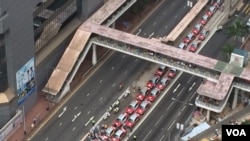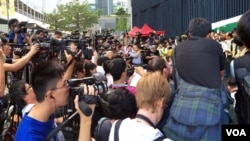As protests in Hong Kong push into their second week, it is not just the fight for more representation at the ballot box that has driven protesters to the streets, but also concerns about economic opportunity. Problems such as the high cost of housing, and worries about how the the port-city's economy is rigged for the rich also are reasons why the protesters want more of a say in the decisions government leaders make.
Hong Kong’s economic prowess as a global financial center and role as a gateway to China have long given the impression that all is well in the famous port city. But as the financial hub’s wealth has grown since the handover from British colonial rule, however, so has the divide between the rich and poor.
Hong Kong’s income gap now is one of the highest among developed economies. Property prices in Hong Kong are among the most expensive in the world, and wages are not growing fast enough to keep pace.
Hot property market
Hong Kong’s government has tried to cool the property market with taxes, including one aimed at foreign buyers in a bid to slow the purchases by speculators with deep pockets from the mainland. But cost of property per square meter continues to rise. In August, property levels hit a new high, according to Centaline Property, one of Hong Kong’s largest property companies.
Dickson, an 18-year-old Occupy protester, said the government has no idea of just how bad things are.
“They never realize that here in Mong Kok, in Causeway Bay, the rent is so high. And, who is behind that? The government and the developers. They’re together," said Dickson. "They make the rents going up. And those people from China are buying gold and buying milk powder. Who needs to buy milk powder every day? Who buys gold every day.”
Hong Kong once was known as a place where people believed in the dream of being able to strike it rich. The billionaire tycoon Li Kai-shing, known as the wealthiest person in Asia, has long been seen as someone who exemplifies that rags-to-riches story, said Francesco Sisci, a China analyst and senior fellow at the Gatestone Institute.
“But now the rich are rich and the poor and middle class are still poor and middle class. So, there is no great social mobility. And many people feel the wealth and stability of Hong Kong has little to do with 'me,'” said Sisci.
Goods and services
Joe Studwell, author of the book How Asia Works, said the protesters might get more traction with Beijing if they focused on the glaring problems of Hong Kong’s domestic economy. Residents in Hong Kong often end up paying more than they should for often inferior services and goods.
“If you took from a helicopter view of the Hong Kong economy you will see that banking is surprisingly uncompetitive, you will see that supermarkets are a duopoly, groceries are a duopoly, Power is two, single geographic monopolies, which cover generation all the way through to distribution. And buses are a cartel with lousy diesel polluting buses… and it just runs through the economy,” he said.
Studwell said that unlike occupying buildings, which Beijing sees as a direct challenge to its authority, if protesters focused more on Hong Kong’s economic problems, it could create some common ground with officials in China.
“It is something that is not only very important in Hong Kong, but it is also something that Xi Jinping and the Chinese leadership can relate to because Xi Jinping has started his administration with not only a very brutal anti-corruption campaign, but also an anti-monopolies campaign in which he has taken on both domestic firms and multi-national firms,” said Studwell.
Although Beijing is not expected to concede to protester demands for greater democratic freedoms, it remains unclear whether Chinese officials are willing to take steps to address the port city’s economic challenges.
Beijing ties
China’s economic success has long been crucial in sustaining the validity of the Chinese Communist Party’s unchallenged rule on the mainland.
Hong Kong traditionally has been an economic link to the mainland, and its top companies have benefited from a close relationship with Beijing. Local governments across China also have gained from the inflow of wealth and investment from Hong Kong.
Hu Xingdou, an economist and professor at the Beijing Institute of Technology said if the relationship between the two continues to worsen, it does not bode well for Hong Kong.
Hu said that Hong Kong could lose out on opportunities for preferential treatment in the future, and bids for projects in the mainland.
He added that if Hong Kong cannot resolve its problems of economic and political development, the situation could continue to go downhill.
Daniel Schearf contributed to this report from Hong Kong.





